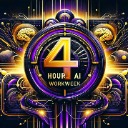Jul 24 in ✍️ ARTICLES
10 Game-Changing AI Tools for Data Science in 2024: Boost Your Productivity and Insights
In today's data-driven world, artificial intelligence (AI) has become an indispensable ally for data scientists. As the volume and complexity of data continue to grow, AI tools are revolutionizing how we analyze, interpret, and derive insights from this information. This article explores the top 10 AI tools that are transforming the field of data science, helping professionals work smarter and faster than ever before.
The AI Revolution in Data Science
The integration of AI into data science has opened up new possibilities for handling massive datasets, automating repetitive tasks, and uncovering hidden patterns. These tools are not just enhancing productivity; they're enabling data scientists to tackle more complex problems and deliver more accurate results in less time.
Top 10 AI Tools for Data Science
1. TensorFlow
Developed by Google, TensorFlow is an open-source library for numerical computation and machine learning. It's particularly powerful for deep learning tasks and can be used across various platforms.Key Features:
- Flexible ecosystem of tools and libraries
- Excellent for building and deploying machine learning models
- Supports both CPU and GPU computing
2. PyTorch
PyTorch, developed by Facebook's AI Research lab, is gaining popularity among researchers for its dynamic computational graphs and ease of use.Key Features:
- Dynamic neural networks
- Seamless integration with Python
- Strong community support and extensive documentation
3. Jupyter Notebook
While not exclusively an AI tool, Jupyter Notebook is essential for data scientists working with AI. It provides an interactive environment for coding, visualization, and documentation.Key Features:
- Interactive computing
- Supports multiple programming languages
- Easy sharing and collaboration
4. ChatGPT
OpenAI's ChatGPT has taken the world by storm with its natural language processing capabilities. For data scientists, it's a powerful tool for code generation, data analysis, and even explaining complex concepts.Key Features:
- Natural language understanding and generation
- Assists in coding and debugging
- Can help with data preprocessing and analysis
5. DataRobot
DataRobot is an automated machine learning platform that helps data scientists build and deploy models quickly.Key Features:
- Automated feature engineering
- Model selection and hyperparameter tuning
- Deployment and monitoring of models
6. Tableau
Tableau, while primarily a data visualization tool, has incorporated AI features that make it invaluable for data scientists.Key Features:
- AI-powered data prep and analysis
- Natural language queries
- Predictive analytics capabilities
7. KNIME
KNIME is an open-source data analytics platform that combines data mining with machine learning.Key Features:
- Visual workflow creation
- Integrates with various data sources and tools
- Supports both coding and no-code approaches
8. RapidMiner
RapidMiner provides a comprehensive suite of data science tools, including machine learning and predictive analytics.Key Features:
- Visual workflow designer
- Automated model optimization
- Integrates with various data sources
9. H2O.ai
H2O.ai offers an open-source machine learning platform that's particularly strong in predictive analytics and deep learning.Key Features:
- Scalable machine learning algorithms
- AutoML capabilities
- Integration with popular programming languages
10. Luzmo
Luzmo is a powerful tool for creating interactive dashboards and visualizations, with AI capabilities that streamline the process.Key Features:
- No-code dashboard editor
- AI-powered chart generation
- Easy integration with existing data platforms
The Impact of AI Tools on Data Science
The adoption of these AI tools is transforming the data science workflow in several ways:
- Increased Efficiency: Automating routine tasks allows data scientists to focus on more complex problems.
- Enhanced Accuracy: AI algorithms can process vast amounts of data with greater precision than manual methods.
- Faster Insights: Advanced analytics and machine learning models can uncover patterns and trends more quickly.
- Democratization of Data Science: User-friendly interfaces and automated processes make data science more accessible to non-experts.
- Improved Decision Making: AI-powered predictive analytics enable more informed and timely business decisions.
Challenges and Considerations
While AI tools offer numerous benefits, it's important to be aware of potential challenges:
- Data Quality: The effectiveness of AI tools depends heavily on the quality of input data.
- Privacy and Security: Handling sensitive data requires careful consideration of privacy and security measures.
- Skill Requirements: Despite automation, skilled personnel are still crucial for effective use of these tools.
Conclusion
The landscape of data science is evolving rapidly, with AI tools playing a central role in this transformation. By leveraging these powerful tools, data scientists can unlock new levels of productivity and insight. However, it's important to remember that these tools are most effective when combined with human expertise and critical thinking. As we look to the future, the integration of AI in data science will only deepen, opening up exciting possibilities for innovation and discovery. Whether you're a seasoned data scientist or just starting in the field, familiarizing yourself with these AI tools will be crucial for staying competitive and delivering value in the data-driven world of tomorrow.
Notes:
Meta description: Discover the top 10 AI tools revolutionizing data science in 2024. From TensorFlow to Luzmo, learn how these game-changing tools are boosting productivity and insights for data scientists across industries.
Tags: AI tools, data science, machine learning, TensorFlow, PyTorch, ChatGPT, DataRobot, Tableau, KNIME, RapidMiner
3
1 comment

skool.com/4houraiworkweek
Use AI to finish a 40-hour week's work in just 4 hours. Then build your AI empire to the BILLIONS with Systems: Workflows, Automation, & No code
powered by






